Mosoq Pakari Sumac Kawsay (a New Dawn for Good Living) Healing House
High in the Peruvian Andes, Indigenous lideresa and Peru’s first Indigenous
congresswoman, Hilaria Supa Huamán, looks out across the grounds of
Mosoq Pakari Sumac Kawsay (a New Dawn for Good Living) a healing house
dedicated to healing forcibly sterilized Indigenous women. SBI has partnered
with Hilaria and Lucia Stavig on this project with the hope to use this healing
center as a model for future Indigenous healing centers in other communities.
“Justice begins with health,” Hilaria says as sacred huamanes (hawks) circle
overhead. For the past 20 years, she has fought for and with the tens of
thousands of Indigenous women forcibly sterilized by the Peruvian government
in the 1990s. In spite of threats against their lives, these women and their allies
have organized for legal justice. Now, they are organizing for their health.
Mosoq Pakari Sumaq Kawsay is the world’s first and only center dedicated to
helping Indigenous women and their communities heal from forced sterilization.
At the center, healers will use ancestral medicine and ceremony to help
sterilized women heal from illnesses related to their forced sterilization, such as
mancharisqa, or soul loss. Doctors understand this illness as PTSD, but this
diagnosis misses its spiritual and communal components. Like in many
Indigenous cultures, being a mother connects women with their communities
and with pachamama, Mother Earth. The traumatic circumstances of their
sterilization cuts these women off from themselves and their communities, a reality which Western medicine has had a hard time seeing or understanding. By coming together to heal on the land using ancestral medicine and ceremony, sterilized women are able to be mothers once again by rebuilding their strength and repairing communities.
Before it has even opened, the center has already provided much-needed
cash-paying jobs for community members. In the last two years—a time
when climate change has wreaked havoc on this agricultural community’s
crops—construction has employed up to a dozen community members at
a time. This includes young women who are learning about the forced
sterilizations, reproductive rights, medicinal plants, and healing arts, as well
as central administration. And now in the COVID crisis, the center is
expanding its mission to care for all community members, with a special
emphasis on women as the backbone of community life.
Mosoq Pakari Sumaq Kawsay is a Leading Community Researcher project. In these projects, SBI provides support to Leading Community Researchers, who are Indigenous scholars, community organizers, and data visualists engaged in critical, innovative work to help us better understand, address, and prevent gender and sexual violence against Indigenous people. The support we provide to these leading community researchers is designed to support them in the good work they continue to do as leaders; each researcher is provided a stipend, assistance from an RA, financial support for their project, and support and feedback from SBI staff, Board, and partners as needed. We are proud of the interdisciplinarity, diversity, intellect, and heart each one brings to the work they are doing with SBI and for our peoples.
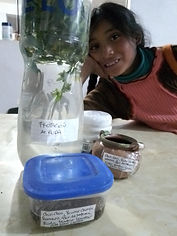
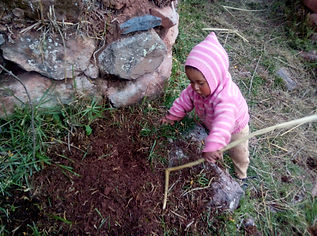

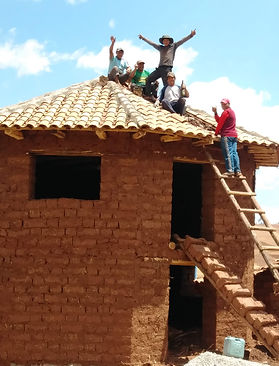
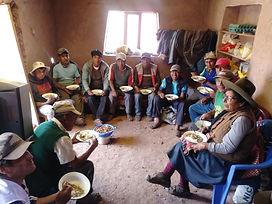.jpg)
ABOUT THE RESEARCHERS
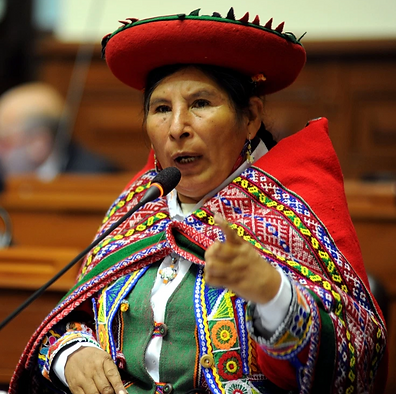%201.png)

HILARIA SUPA HUAMÁN
Hilaria Supa Huamán (born 1957) is a Peruvian politician, human rights activist, and an active member of several Indigenous women's organizations in Peru and the world. She was a Congresswoman representing the Cusco for the period 2006-2011.
Born before indigenous peoples in the Andes were freed from perpetual servitude under the hacienda system in 1969, she saw the hacendado or farm owner mistreat her grandfather and rape the local women, which had a crucial impact on her life. Her grandfather, who fought for farmers rights, was murdered in 1965.
In the 1980s she became involved with other Indigenous women in organizing a community program that provided with free meals for poor children. She became leader of the Micaela Bastidas Committee in Anta, Cusco and took part in the fights for land rights. She was also leader of the Federación Departamental de Campesinos del Cusco, the regional organization of the Confederación Campesina del Perú in Cusco.
In 1991 she became the Organizational Secretary of the new founded Women's Federation of Anta (Federación de Mujeres de Anta FEMCA), where she was responsible for alphabetization programs, traditional medicine preservation and pesticide issues.
Hilaria Supa has taken part in numerous international women rights meetings, where she has actively used and promoted her Native Quechua language. In 1995 she led a protest and lobbying against forced sterilization of women and men, done under the dictatorship of Alberto Fujimori.
Hilaria Supa was elected to the Peruvian Congress in 2006, taking the oath in Quechua, followed by her fellow Congresswoman María Sumire. Doing this she became the first parliamentarian in Peru's history to take the oath in any Indigenous language. Congresswoman Hilaria Supa participated twice at the United Nations Permanent Forum on Indigenous Issues, where she denounced the crisis that her community was facing, after free trade policies and abusive decrees had been passed by the Peruvian government of Alan García in complicity with the U.S. government.
In August 2010 Hilaria was elected president of the Education Commission of the Peruvian Congress. In April 2011 Hilaria was elected as candidate of Gana Perú into the Andean Parliament. After finishing her term in 2016, Hilaria moved back to her home community in Anta where she currently resides.
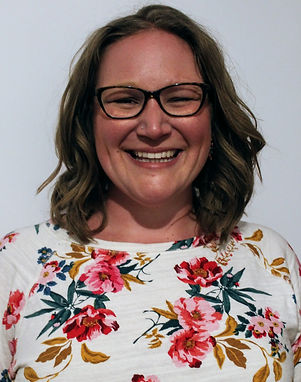
LUCIA ISABEL STAVIG
Lucía Isabel Stavig is a doctoral candidate at the University of North Carolina at Chapel Hill under the supervision of Dr. Florence Babb. She received a Master’s in Anthropology from the University of Lethbridge, Canada in 2017, a Master’s in Justice and Social Inquiry from Arizona State University in 2013, and a Bachelor of Arts from New College of Florida in 2010.
Lucía is Peruvian-American, and as a small child spent a formative year in Sucre, Bolivia where her parents and indigenous friends taught her what it meant to be a different kind of misti (“white” person in the Andes). Lucía has had the honor and privilege to learn with and from the zapatistas in Chiapas, Mexico. She is an adopted member of the Many Grey Horses clan of the Kainai (Blackfoot Confederacy) in the colonial state of Canada, and proud comadre (co-mother) in the Parihuara Ttito family.
As a person with many homes, Lucía’s life’s work is to bridge gaps in understanding between the various worlds that continuously co-create her. Her current scholarly project with Mosoq Pakari Sumaq Kawsay works to understand and explain justice in its many forms across worlds so as to help build a more just and verdant world for all.
